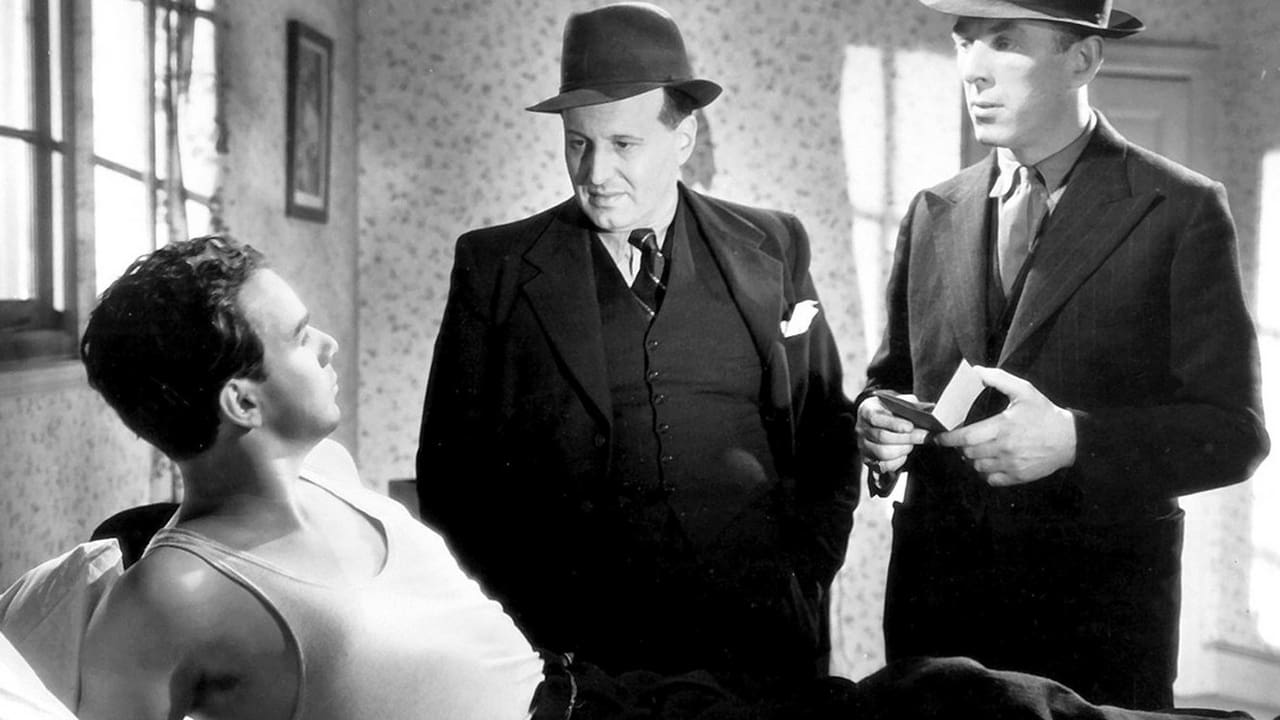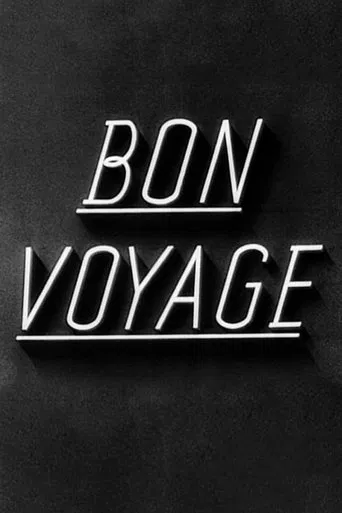

"Bon Voyage" was one of two short French language propaganda films made by Alfred Hitchcock for the British Ministry of Information in 1944, the other being "Aventure Malgache". The film depicts the escape of a downed Royal Air Force air gunner through German-occupied France, with the assistance of Resistance fighters. The purpose was presumably to inform French exiles in Britain and America, and those living in territory controlled by the Free French Government, of the work being done, and the sacrifices being made, by their compatriots in the Resistance. The film is very short, at only 26 minutes long, and today is likely to be principally of interest to Hitchcock completists. It does, however, have its points of interest, notably its use of multiple viewpoints of the same events, a technique that looks forward to later films such as Kurosawa's "Rashomon". We see the airman being debriefed by a Free French intelligence officer in London and quickly realise that the intelligence officer knows things about the escape that the young man himself is unaware of, especially that he has been an unwitting pawn in a German scheme for getting information to one of their agents in Britain. Another theme of the film is a warning to the French to be on their guard against the dirty tricks of the Germans and their Vichy French collaborators. "Bon Voyage" was presumably intended principally as a propaganda film rather than as dramatic entertainment; had it been intended as the latter, it would have needed to have been at least three times as long. This is the reason why I have not awarded it a mark out of ten.
... View MoreI have read a couple of message board comments on this film slating another reviewer (who didn't like it) for not understanding its "role" so for fear of upsetting those unable to cope with different opinions let me just say what I understand to be the case. Bon Voyage was one of two short films made by Hitchcock to encourage and bolster the French resistance by putting them at the core of the films and making them in French. It was an important gesture from the famous director and I'm sure was appreciated by those risking their lives in occupied France. However if all I am allow to comment on is its "role" then I should stop the review there.Fortunately for me, the sight of a "0 of 10 users found this review useful" slogan doesn't bother me at all, so I will do what I normally do and just state my opinion and move on. Other than the war-effort significance, there is not much to this film to recommend it for now. The plot is set up in a terribly stiff device of flashbacks which puts a lot of pressure of the narration another device that doesn't totally work. The story itself has a few twists but the delivery does suck the life out of them and, contrary to what others might say, there isn't much in the way of classic Hitchcock to be had here. The end result is a plodding and simplistic tale that is dull and straightforward.So by all means, let's hold up Bon Voyage as a worthy effort on the part of Hitchcock and give it its dues in regards supporting the resistance but please let's not pretend that it is a good film worth seeking out because it most certainly is not.
... View MoreShot in 1944 entirely in French (version seen has English subtitles), in style rather like a short section of a budget version of his "Lady Vanishes", it must have been intended for clandestine distribution in occupied and Vichy France. For this reason and the fact that it appears to have a clear practical purpose it presumably is a training film. It is thus not primarily a tribute to the French Resistance, its purpose seems instead to be to warn them of a dangerous new Gestapo method of infiltration. Hitchcock's contribution was to make the message clear and hold the attention.It concerns the return to England of a British air-gunner (played by English actor John Blythe in French) recently escaped from a German prisoner of war camp. He has safely arrived back in London due to the help he received from the French Resistance and is being de-briefed by French exile officers. What should though have been a happy conclusion to a successful escape is soured when the true tragic facts are revealed to him that he has been an innocent pawn in a dastardly Gestapo design for the infiltration of the French resistance network. In this he was made a carrier of something deadly - not disease but something similarly poisonous - that he had been made to unwittingly expose members of the Resistance. One guesses that the main purpose of the film was to warn everyone of this.
... View MoreDisclaimer: This review is based on versions of Bon Voyage and Aventure Malgache as seen on Turner Classic Movies. These versions were copyrighted 1993, and I'm assuming they are the same versions previously available on VHS and more recently on DVD. The following criticism is aimed at saving people much grief and money. If someone has seen the DVD and can disqualify any of my remarks, I welcome you to do so. There are so few accurate reviews of obscure DVDs.Alfred Hitchcock made Bon Voyage and Aventure Malgache (Madagascar Adventure) in 1944 to help the war effort by encouraging the French Resistance. The only people who have ever heard of these short films are Hitchcock fanatics, but even the most die-hard fans need not waste any time looking for these rarities. There is little in Bon Voyage and nothing in Aventure Malgache to indicate the hand of Hitchcock. Both films are in French and suffer from boring framing stories hung with flashbacks and constant voice-over narration. It is unlike Hitch to use so much dialog and the subtitles are difficult to read. The white lettering is hard to read against lighter parts of the background and at least half of the subtitles in Bon Voyage are cropped off the bottom of the screen.Aventure Malgache tells of the French Resistance smuggling people out of Nazi-controlled Madagascar and is a completely forgettable film. Bon Voyage is more interesting. It tells of a British flier who has escaped from a POW camp. He is traveling with another escaped POW and helped by the Resistance, but there are double-crosses and murder in their path. However, only the murder scenes look like Hitchcock while the other scenes are very static. There is minimal camera movement and when the actors aren't sitting around talking they are shuffling around like zombies. The cropped subtitles leave viewers guessing at many of the finer details. Many references to passwords, place-names, and other important details (something about a cigarette used as a signal) are completely illegible. Bon Voyage does include the "old Gestapo trick" that Martin Landau mentions near the end of North By Northwest, but this is the only connection I could see to Hitch's other films.If the DVD is significantly better than what I have described (new subtitles in yellow, for instance), please write a review saying so. It is very hard to find detailed reviews of obscure foreign films on DVD. Now I'm going to go critique the 1990 version of Cyrano.
... View More